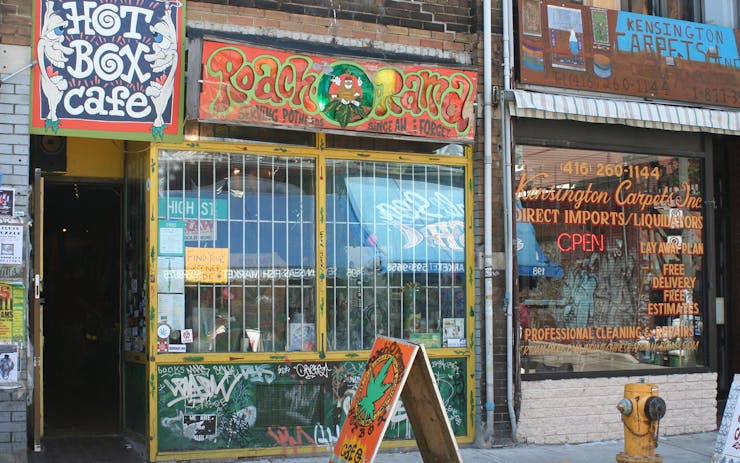People who visit Toronto a year from now expecting to light up legal cannabis at a bar or restaurant will be sorely disappointed.
In a meeting on Sept. 18, Toronto’s Municipal Licensing and Standards Committee voted 4-1 to follow the Ontario government’s lead and deny permits to businesses that allow people to smoke cannabis on their property even after legalization is introduced next summer. The committee also voted in favor of tougher penalties for businesses that allow patrons to smoke cannabis.
Several cannabis advocates appeared before the committee, telling members that a plan restricting cannabis smoking to private homes is “not feasible” because it would, in effect, prevent many people from smoking it altogether.
Abi Roach, director of the Cannabis Friendly Business Association and owner of Hotbox Cafe, a popular cannabis lounge, noted that half of Toronto’s housing market consists of rental units, the vast majority of which are non-smoking.
“Are landlords expected to allow cannabis smoke in apartments that have no-cigarette-smoking rules?”
“Are landlords expected to allow cannabis smoke in apartments that have no-cigarette-smoking rules?” she asked. “Will this take into consideration neighbors, roommates, and others living in close proximity to units occupied by cannabis consumers?”
Even people who own homes would prefer to smoke cannabis elsewhere because they live with children or elderly parents, according to Roach. She added that, when recreational marijuana becomes legal next year, many tourists will buy cannabis in Toronto but won’t be able to smoke it in their non-smoking hotel rooms.
Roach wants the city to license cannabis lounges such as hers. She sees her lounge as an ideal place to smoke marijuana because it facilitates smoking in a communal setting and keeps illegal activity such as trafficking off the streets. Patrons, who pay a five-dollar admission fee, must be at least 19 years of age (the legal drinking age in Ontario) and bring their own marijuana. They cannot bring other kinds of drugs or alcohol. Patrons can use a vaporizer inside or combust their cannabis on an outdoor patio.
Roach believes cannabis consumers are being treated unfairly, given that people are allowed to consume alcohol in public bar-like settings and tobacco users are allowed to smoke on public sidewalks and open outside spaces.
Councilor Glenn De Baeremaeker was adamantly opposed. “We don’t allow [tobacco smoking] in commercial establishments, we don’t allow it in offices, we don’t allow it in restaurants …. If you want to smoke marijuana, smoke it in the privacy of your own house,” he said.
Councilor Jim Karygiannis’ position was more in line with that of the cannabis advocates. He described Ontario’s approach to marijuana legalization as a big “mistake” and urged the committee to reject being a part of it.
Sarah Hanlon, a cannabis columnist and former employee of the lounge Vapor Central, told Leafly the fight for licensing is not over. She plans to reach out to Karygiannis and other councilors in the near future in addition to “doing more letter writing and emailing.”
She also said it’s important for lounge owners to continue to be good corporate citizens—to organize community events, raise money for charity and undertake other initiatives. “That way, city officials will see that by shutting down a cannabis lounge they are hurting a community,” she told Leafly. “Municipal officials have granted licenses to dispensaries in Vancouver and it can be done here, too.”
Also at the council meeting, cannabis advocates voiced their opposition to the province’s recently announced plans to allow sales only through stores affiliated with the government-run Liquor Control Board of Ontario and to crack down on dispensaries.
Lisa Campbell, one of the founders of a popular craft cannabis farmers market called Green Market, addressed council on behalf of privately owned licensed dispensaries. “The fact that [the province] has decided that they would like to take our jobs and distribute cannabis is actually a sign of normalization,” said Campbell. “We are starting from a restricted framework but there’s lots of room to create diverse licensing.”
Campbell added that there won’t be enough government-run stores to meet demand for cannabis. (The government plans to have 150 storefronts open by the end of 2020.)
She also chided government for not engaging in conversation with community cannabis businesses. She said that in order to eliminate the black market—the stated goal of all levels of government—the existing grey market needs to be brought into the fold.
Councilor Karygiannis openly questioned why dispensary owners hadn’t been consulted on how the city should respond to the province’s regulations, which were introduced Sept. 8. “I’m glad he was able to mediate the process and help our voices be heard,” Hanlon said, hopefully.
“We are working to garner political support for diverse cannabis licensing for consumption spaces so that it’s not just big business dominating the industry,” Campbell told Leafly. She added that “social clubs could be a good alternative to dispensaries and lounges, as a hybrid model which is municipally regulated with supply from federally approved licensed producers.”
Both Campbell and Hanlon told Leafly they feel hopeful. Said Hanlon: “At least the conversation has started.”





